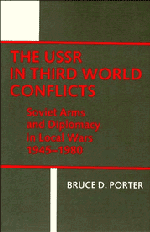Book contents
- Frontmatter
- Contents
- Preface
- 1 Introduction
- 2 The USSR in local conflicts: a historical overview
- 3 Soviet power projection: advances in postwar military capabilities
- 4 The case studies: a framework for analysis
- 5 The Yemeni civil war
- 6 The Nigerian civil war
- 7 The Yom Kippur war
- 8 The Angolan civil war
- 9 The Ogaden war
- 10 Conclusions
- Index
8 - The Angolan civil war
Published online by Cambridge University Press: 05 August 2011
- Frontmatter
- Contents
- Preface
- 1 Introduction
- 2 The USSR in local conflicts: a historical overview
- 3 Soviet power projection: advances in postwar military capabilities
- 4 The case studies: a framework for analysis
- 5 The Yemeni civil war
- 6 The Nigerian civil war
- 7 The Yom Kippur war
- 8 The Angolan civil war
- 9 The Ogaden war
- 10 Conclusions
- Index
Summary
It was an improbable locus for a superpower collision.
John A. MarcumThe Angolan civil war marked the USSR's debut as a major power in Africa. Although the Soviet Union had been involved as an arms supplier in African conflicts before – the Nigerian civil war being a prominent example – never had Soviet arms shipments to any black African country reached the massive levels that were attained in Angola. Nor had large numbers of Cuban troops ever before intervened directly in a Third World country. From the point of view of Washington, the Soviet-Cuban intervention in Angola was a dangerous and unprecedented power play, an offensive thrust that went beyond the traditional geographical perimeter of Russian interests and beyond the accepted postwar “rules of the game” for international behavior. From Moscow's point of view, the war evidently was seen as an opportunity to maintain the global strategic and diplomatic momentum that had been gained with the Communist victory in Vietnam. A massive Soviet-Cuban intervention in sub-Saharan Africa would have been unthinkable only a few years earlier and highly improbable even a year earlier, before Saigon fell. But Hanoi's conquest of the south, by arousing isolationist sentiment in the United States, created the very condition that made the USSR's involvement in the Angolan conflict both feasible and ultimately successful. As a result of the victories in Vietnam and Angola, Brezhnev was able to enter the twenty-fifth congress of the CPSU in February 1976 atop a crest of impressive foreign policy successes.
- Type
- Chapter
- Information
- The USSR in Third World ConflictsSoviet Arms and Diplomacy in Local Wars 1945–1980, pp. 147 - 181Publisher: Cambridge University PressPrint publication year: 1984



